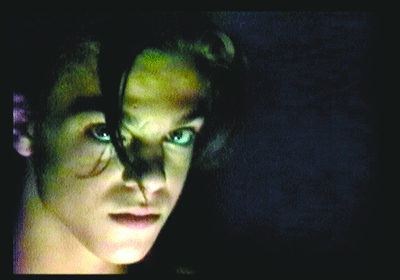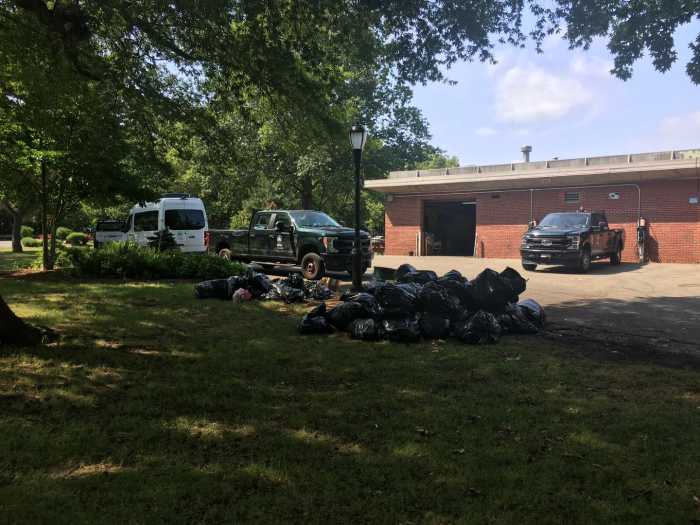By SETH J. BOOKEY
Jonathan Caouette explores his troubled family life captured in 20 years of his own film clips
The advent of home movies, cassette recorders and video cameras has allowed average Americans the ability to record themselves endlessly. For many, family events, baby videos and school plays are captured on video but never seen, or looked at much later on as curiosities at reunions.
But there’s one young filmmaker out there who began recording himself when he was 11 and captured more than the usual staged events of family life. Instead, he tracked what proved to be a heroic effort to build his identity as a sane, caring, adjusted gay man amidst severe, even crippling crises in the lives of his mother and of the maternal grandparents who raised him.
Meet Jonathan Caouette, once from Texas and now a New Yorker, in his film “Tarnation,” a kaleidoscope of his two decades of filming seemingly everything in his life. Everything, that is, except his repeated institutionalizations, and his mother’s longer stays in mental hospitals. The result of Caouette’s efforts is a stunning exploration of his life’s traumas, reflected back in thousands of deep, dark, truthful mirrors. These reflections come in the form of audio snippets, home movies, student films and photos. Caouette also throws in images of TV shows and movies that have, at points in his life, influenced him, shaped him and comforted him.
“Tarnation” is nothing if not intense. Caouette’s own history is interwoven with his mother Renee’s, so he starts the story with the meeting of his grandparents, and Renee’s birth. A teenage accident, that the film vaguely suggests might have been a suicide attempt, left Renee paralyzed. Months after the accident, doubting that her paralysis is real, Renee’s parents make the dubious decision to place her in a mental hospital, and later to begin a course of electroshock therapy repeated more than 100 times over 30 years.
Before telling this story, Jonathan offers a brief look at Renee in 2002, suffering from the effects of excessive lithium intake in Texas, as her son, thousands of miles away, worries about her suffering brain damage and perhaps even dying. But before we learn how he responds, he takes us back to when it all began. His mother had been a model since childhood, and his giant collection of his own images is complemented by innumerable photographs of his beautiful mother as a young woman. Rather than using voice-over to tell his story, Caouette relies on subtitles as the images of him and his family split from one image into four, into 16, into dozens, looking like a visualization of an acid trip at times. The film is a documentary but its influences—underground films, found footage, music videos—help transform “Tarnation” into something closer to an examination of Jonathan’s state of mind.
The film has its share of contemplative moments, but the persistent undercurrent of mental illness and dysfunction transmit a nervous energy that makes it one very wild ride. Even as we are watching seemingly normal family photos on the screen, the titles tell us of various traumas—Renee’s repeated hospitalizations, Jonathan’s birth after his parent’s brief marriage has already fallen apart, Renee’s flight to Chicago with an infant Jonathan who is forced to watch her being raped. In the immediate aftermath of this trauma, Jonathan winds up in foster homes, where he is physically abused before eventually being adopted by his grandparents.
As a young teenager, Jonathan suffers a bad reaction to a pair of laced joints, and he too is sent to an institution, where he returns periodically in the years that follow. Jonathan’s only refuge is popular culture, and years underage, he begins hanging out at a local gay bar, disguising his youth by going in drag. Throughout “Tarnation,” we see Jonathan in dozens of guises, from the blond innocent baby boy to the teenager who changes his looks, hair style and hair colors with startling versatility. In one early film clip, we watch an 11-year-old Jonathan, dressed as an abused adult women, evoking her emotions with haunting authority, even as he simultaneously seems to be offering a pop culture paean to a John Waters aesthetic. Despite the troubled vein of some of these clips, we also see Jonathan in exuberant celebration of music and of his young gay peers, one of whom becomes his high school boyfriend.
Tarnation” is reminiscent of “Capturing the Friedmans,” Andrew Jarecki’s Oscar-winning documentary of a family’s meltdown that similarly relied on countless hours of home videos. In Caouette’s case, it seems as if the exercise of holding a camera up to his life, painful as it often must have been, inevitably helped him more than it hurt. Many people look back lovingly at family history while deluding themselves about what really happened. Caouette cannot do that—he’s got it all on film. As director, he is in control of the story and the editing, but the strength of “Tarnation” lies in its willingness to hew to the truth in all the madness, of which we see plenty.
By the end of the film, we learn that Jonathan has grown up to be the most reliable, able member of his family—in fact, the only one who seems fully functional amidst all the pain they have caused each other. Cauouette holds out the possibility that in spite of all the abuse in his family, there was also real love. It’s hard to determine whether Jonathan and his mother were saved by this country’s mental health system or hung on in spite of it, but clearly Jonathan is a survivor willing to extend his hand and heart to others less able to cope.
In “Tarnation,” we see that Jonathan Caouette is a very talented filmmaker—and obviously, his talent has been noticed. Filmmaker Gus van Sant and John Cameron Mitchell, creator of “Hedwig and the Angry Inch,” were executive producers on this project, playing a critical role in helping Caouette shape an unforgettable story out of his life’s archive. We will likely see more of Caouette’s work in the future, but “Tarnation” is the sort of film he will only be able to make once, precisely because it is so personal and also so painful.
Read More: https://www.amny.com/news/its-time-for-n-y-u-to-stop-blocking-superblocks-transfer/





































